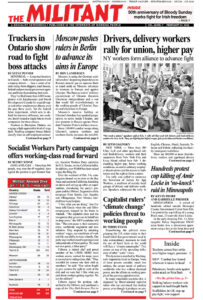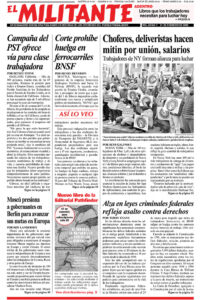LONDON — In a bloody assault against the struggle for civil rights and Irish independence, the British Army’s paratroop regiment on Jan. 30, 1972, gunned down protesters in Derry, Northern Ireland. Fourteen were killed and many more injured. Fifty years later the Bloody Sunday massacre was marked with a remembrance walk by many hundreds along the same route as the original march.
Family members of the victims, who have tirelessly campaigned to get out the truth about the slaughter, were prominent in the commemoration. For the first time the Irish government was represented. Prime Minister Micheal Martin attended.
“It’s important for the rest of the world to see what they done to us,” Charlie Nash, brother of William Nash, one of those killed in 1972, told the media.
The 1972 march was organized by the Northern Ireland Civil Rights Association to protest the British government’s imposition of internment without trial. It was part of a rising movement for equal rights for Northern Ireland Catholics, who faced discrimination in housing, education, employment and voting. The 1972 Derry protest was banned by authorities, but demonstrators went ahead anyway.
The fight against the caste-like conditions foisted on the Catholic population was a dagger pointed at the heart of policies aimed at entrenching British domination. Bosses’ divide and rule, pitting Catholic and Protestant workers against each other there and elsewhere in the U.K., had been central to undermining working-class solidarity and deepening capitalist exploitation for decades.
Fearful that the fight for civil rights would fuel support for British withdrawal and a united Ireland, London intensified its efforts to crush the movement. The British rulers have clung onto the northern six counties of Ireland since 1921, when a war for independence drove them out of the rest of the country, establishing the Irish Republic in the South.
In 1969 the Labour government sent troops to quell the threat to London’s rule. Over the next three decades, some 250,000 soldiers were deployed — the mainstay of a bipartisan assault that included the paramilitary Royal Ulster Constabulary, nonjury courts, state collusion with pro-British Loyalist death squads, frame-ups and a heavily fortified border with the South.
In August 1971, the introduction of internment without trial fueled resistance to British rule, rather than quash it as the government hoped.
Following the killings, the British state did everything in its power to justify the slaughter. A tribunal under the U.K.’s top judge, Lord Chief Justice Widgery, was rapidly convened to lead the cover-up. He exonerated the killers, blamed the “illegal march” and backed the army’s claim that soldiers had been fired on first.
But the struggle to get out the truth went on, spearheaded by the families who denounced Widgery’s whitewash. Demands for a new inquiry became part of the fight for what had by then become a struggle for British withdrawal. The families won support from millions — in the Irish Republic and around the world — but the British rulers resisted their demands for years.
Under growing pressure, then Prime Minister Anthony Blair in 1998 established a new inquiry into the massacre — part of moves that led to the Belfast Agreement between London, Dublin and political parties in Northern Ireland later that year. That deal signaled an end to a military conflict that claimed the lives of over 3,500 people. This was a blow to anti-Catholic discrimination.
The new inquiry by British judge Mark Saville dragged on for years, publishing its findings in 2010. It acknowledged troops had fired without warning and killed protesters who were unarmed, contrary to the lies peddled by the rulers. No one has been charged with the killings.
In a letter to the Bloody Sunday Trust on the 50th anniversary commemoration, Communist League leader Peter Clifford wrote: “Your efforts shone a spotlight on the deadly violence London used to maintain its rule.”
Clifford had been arrested under so-called anti-terror laws and interrogated in Northern Ireland in 1988 after traveling there to visit Irish republican prisoners and to distribute books by revolutionary working-class leaders.
“We were proud” to be part of the families’ struggles, Clifford wrote. It “put working people in a stronger position to face the inevitable class battles, less divided, more conscious of the brutality of London’s capitalist rulers, but above all more aware that through struggle we can change the course of history.”

